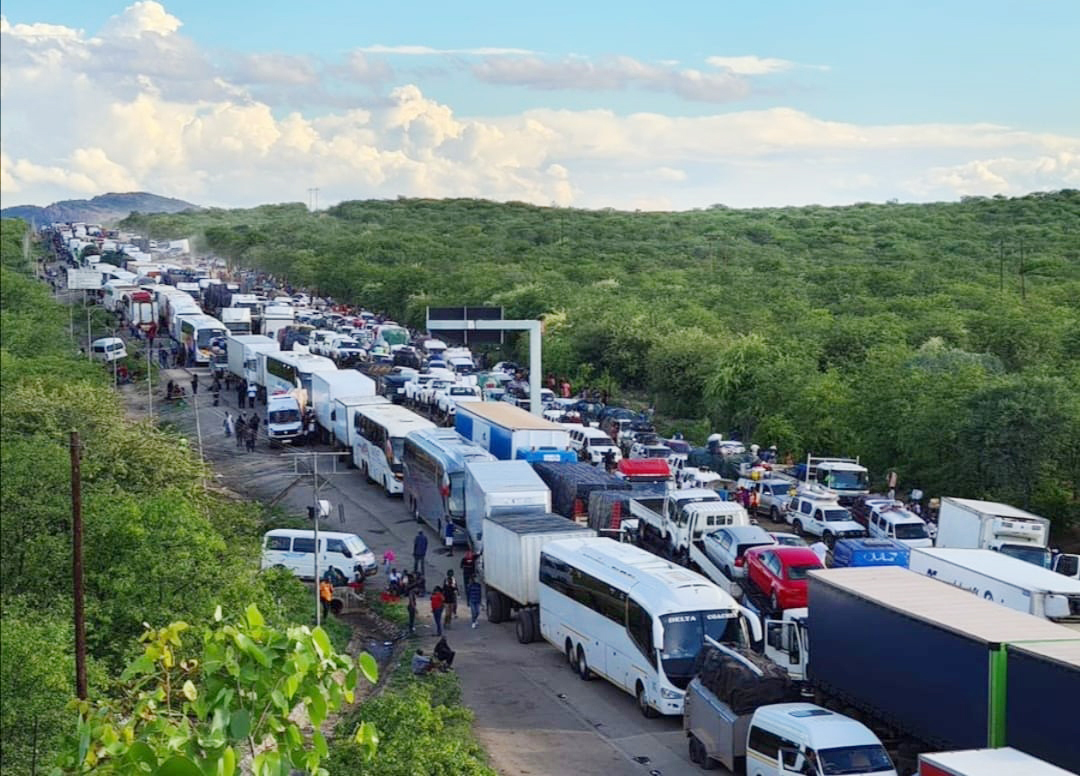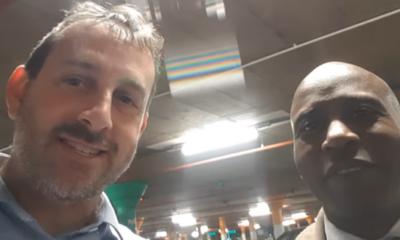
Featured Item

SA Jews ‘should condemn u-turn on Zimbabwean immigration’
Published
2 years agoon
By
Nicola MiltzZimbabwean housekeeper Thandi Moyo (not her real name) has been living and working in South Africa for 10 years with her partner and their two children. They came with next to nothing, and have slowly made a life for themselves.
Each month, they send some money and goods to their families across the border in addition to keeping food on the table and educating their children, one of whom was born here.
Moyo is a domestic worker for a Jewish family in Sandton and a qualified part-time frail-care practitioner. Her husband is a minister, a driver and a butler, who also works for a Jewish family in Johannesburg. Both have a firm grasp of kashrut, Jewish traditions and customs.
The couple left their embattled, economically-stricken country in search of a better life. Last year, they were eventually able to get married after Moyo’s husband finally finished paying lobola, made possible only by employment in this country. This all hangs in the balance now.
They hold Zimbabwean Exemption Permits (ZEPs), which the South African government decided to scrap last December. This means they face deportation and being forced to uproot their lives and return home to start again from scratch.
“The other choice, which is too scary to consider, is to continue living in Johannesburg as undocumented aliens,” says Moyo’s husband, a deeply religious man.
They are among about 178 000 Zimbabweans who will be affected by the government’s decision not to renew the ZEP, which was allowed to expired. These permit holders were given until the end of December 2022 to legalise their status in the country, a seemingly impossible task, they say.
Naledi Dube (not her real name) is a char for a Jewish family in Sydenham, Johannesburg. Three of her four children were born in South Africa, but none have a South African birth certificate, only an unabridged certificate which claims they were born here but aren’t South African citizens.
She has chosen to live under the radar, waiting to see “which way the wind blows”. She lives about 400m from the Yeoville Market, parts of which were recently gutted after an alleged xenophobic attack against foreign-owned stall owners.
“I won’t go back unless I’m deported. I’ve been here for so many years, this is where my life is, even though I’ll be undocumented, which is scary,” Dube says.
“My children don’t know where they belong. They were born and raised here, but don’t have a South African ID. Nor do they belong in Zimbabwe. They don’t know who they are meant to be. The system doesn’t allow them to know,” says Dube.
Many are praying for a waiver, which allows the home affairs department to disregard certain requirements for permission to stay, such as if an employer can prove they have advertised for a job but no South Africans qualified for it. They can also apply for a waiver if they can prove that they have critical skills, which many of them don’t.
To obtain a waiver would be a miracle, they say. Without legal status after the December deadline, their bank accounts will be closed.
The Helen Suzman Foundation (HSF) has taken Home Affairs Minister Aaron Motsoaledi to court, seeking to set aside what it describes as a “hasty, untransparent, and ill-considered” decision not to renew the ZEP beyond December 2022.
This has attracted the ire of the minister, who recently lambasted the HSF and nongovernmental organisations that support it for interfering in the process, causing further tension.
HSF Executive Director Nicole Fritz said in her affidavit before court that not renewing the ZEP would expose Zimbabwean immigrants to the dangers of xenophobic attacks, extortion, detention and deportation.
“They will lose their jobs, businesses and homes. They will lose access to banking services. Their children could be denied access to schooling, medical care and social services, and they will be forced to return to Zimbabwe.
“They will be given a desperate choice: to remain in South Africa as undocumented migrants with all the vulnerability that attaches to such status, or return to a Zimbabwe that, to all intents and purposes, is unchanged from the country they fled,” says Fritz.
“There are thousands of children who have been born in South Africa to ZEP holders during this time who have never even visited their parents’ country of origin,” Fritz says.
The HSF wants a judge to rule that the minister’s decision to terminate the ZEP, announced in January this year, is unlawful, unconstitutional and invalid, and that it be reviewed and remitted back to the minister for reconsideration “using a fair process” involving meaningful engagement with those affected and civil society.
The situation appears hopeless, and it should resonate with every Jewish person in the country, says Gavin Morris, the director of the South African Jewish Museum in Cape Town.
The community faced similar restrictions in the past, he says, when the government tried to diminish the number of Jews in the country with various immigration-restrictions: the Quota Act of 1930 and then the Aliens Act of 1937, which was aimed at severely curtailing Jewish immigration to South Africa.
“We have been kicked out of every country we have settled in throughout the ages. This is the reason why we have been called ‘wandering Jews’, because we couldn’t stay anywhere. So it’s close to home,” says Morris.
“If this had happened 100 years ago, it would have been us facing this uncertainty. Take a minute to think about what our community has contributed to this country. Can you imagine if we hadn’t been allowed to flourish, can you also imagine being allowed here and then forced to leave?” he asks.
Romy Peterson of Afrika Awake, a nongovernmental organisation which focuses on assisting refugees and asylum seekers, says she feels helpless and despondent.
“It’s all so sad. There appears to be no will for this to change. The situation is beyond cruel. I know hundreds of people who have been here for many years who have built businesses, have jobs and are now at a loss. It’s unbelievable, blatant xenophobia.”
She says Afrika Awake had communicated with dozens of people who had decided, albeit reluctantly, to leave rather than continue to face the unknown.
“I have no answer and no solution. I’m just hoping that the matter will be resolved by some miracle in the courts,” she says.
Alana Baranov, the political and social justice liaison of the South African Jewish Board of Deputies, said this week that the Board was “deeply concerned” about the humanitarian crisis that could result from the termination of the ZEP.
“This decision will mean that more than 178 000 Zimbabweans who have been living, working and going to school legally in our country for nearly a decade will not only be faced with huge upheaval in their lives and the prospect of having to start over, but also the threat of deportation.
“We’re also saddened by the lack of options available to Zimbabweans who have made South Africa their home for many years and contributed not just to our economy but all aspects of our society. The massive backlogs at home affairs mean that other permit options theoretically available to Zimbabweans, including applying for asylum due to the continuing economic problems and human-rights abuses in their home country, are very difficult to obtain,” Baranov says.
“As a community that had first-hand experienced of seeking refuge from violence and repression, with generations of Jews around the world being forcibly uprooted and having to rebuild their lives all over again in foreign lands, we should use our voice to call on the department of home affairs to address the real and distressing implications for permit holders come the 31 December deadline,” she says.
“Jews, with our values of tikkun olam (repairing the world) and tzedek (justice), need to ensure that South Africa treats those most vulnerable in our society, including the orphan, widow and stranger, with humanity, dignity and respect.”











Mason Hall
Jul 7, 2022 at 10:20 pm
Pandering to xenophobes at the expense of 178,000 law abiding, community participants who have made families and homes in SA flies in the face of its constitution. The wounds from the myopia of the Minister will be long lasting and deep.